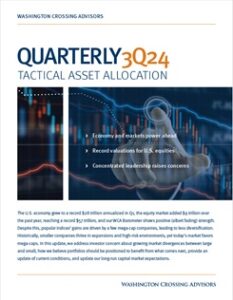Putting Dividend Growth to the Test

The “Case for Rising Dividends” rests on a crucial proposition: that dividend growth tends to point to quality. In this brief, we wish to put this proposition to the test using evidence from the COVID-19 pandemic. We will rely on two sets of data: portfolios created based on dividend behavior in the aftermath of the pandemic and our WCA Quality “Grades” from the onset of the pandemic. Those “grades” are based on a company’s predictability, indebtedness, and profitability. The question we ask is whether dividend behavior and quality are, indeed, related?
The Evidence
Year-to-date, we see stocks of companies that cut dividends last year rising faster than those which increased the dividend (Chart A, below-left). At the same time, we see low-quality company stocks also running ahead of high quality (Chart A, below-right). While quality dividend growers are lagging this year, the key takeaway should be that the right and left graphs below look very similar. This suggests that dividend behavior (left graph) and quality (right graph) are clearly related.
Chart A
Dividend Behavior (Left) or Quality (Right): Performance is Similar
Year-to-Date 2021 Through October
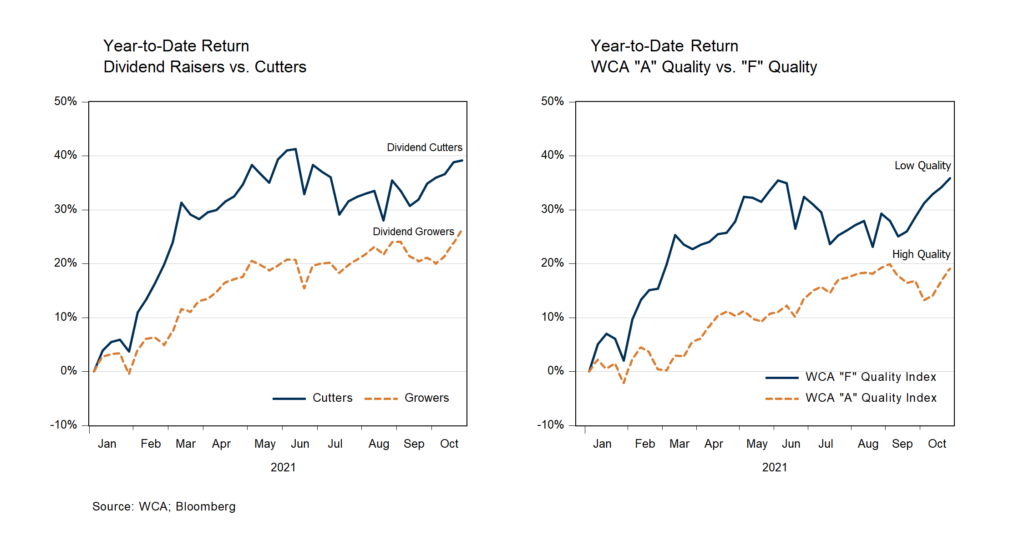
More Evidence
We also see a clear relationship over the pandemic period from January 2020 through October 2021 (Chart B, below). As the pandemic set in, nearly all stocks fell. The “A” Quality companies and those who would go on to raise dividends in 2020 fell 29% and 34%, respectively. Yet the “F” Quality companies and dividend cutters fell a massive 47% and 52%, respectively.
Those drops were followed by improvement. Today, the return for all categories of stocks since early 2020 is about 50%. Once again, the critical insight is that the left graph (based on dividend behavior) looks much like the right graph (based on quality). The pandemic era confirms the proposition: that dividend growth tends to point to quality.
Chart B
Dividend Behavior (Left) or Quality (Right): Performance is Similar
January 2020 – October 2021
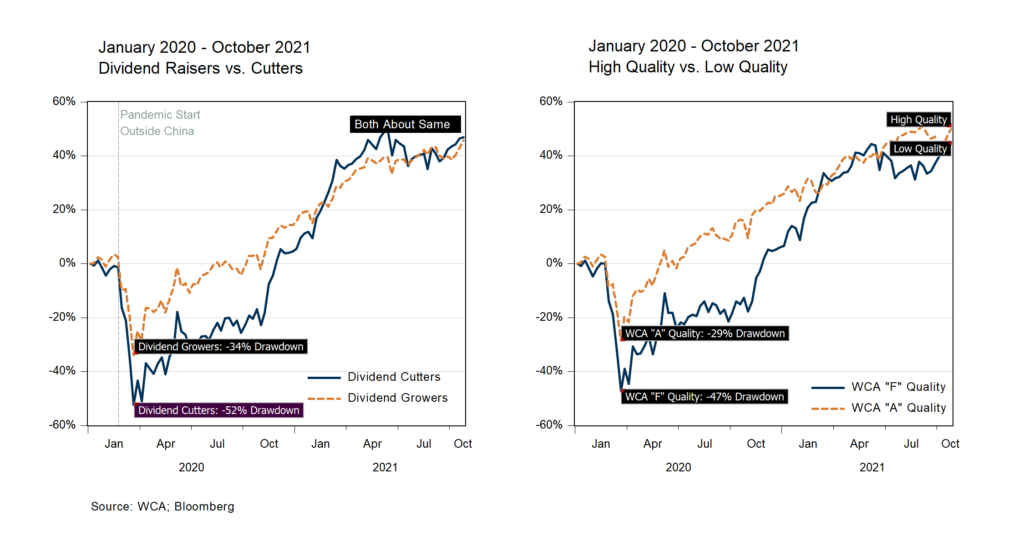
Deeper Dive
We also looked at the 1,000 largest U.S. companies at the start of 2020 and asked, “Which companies cut or raised dividends during the year?” Our analysis showed 448 increased dividends, 100 cut, and 452 had no change. We then asked what the composition of the growers and cutters looked like based on our WCA Quality “Grade.” Chart C below shows that the growers tended to be of much higher fundamental “quality” than cutters, which tended to be low “quality.” It should be noted that we determined quality before the start of the pandemic to avoid biasing the result. This result further validates the idea that dividend growth tends to point to quality.
Chart C
Dividend Increasers Tend to be High Quality, Low Quality Tend to Cut
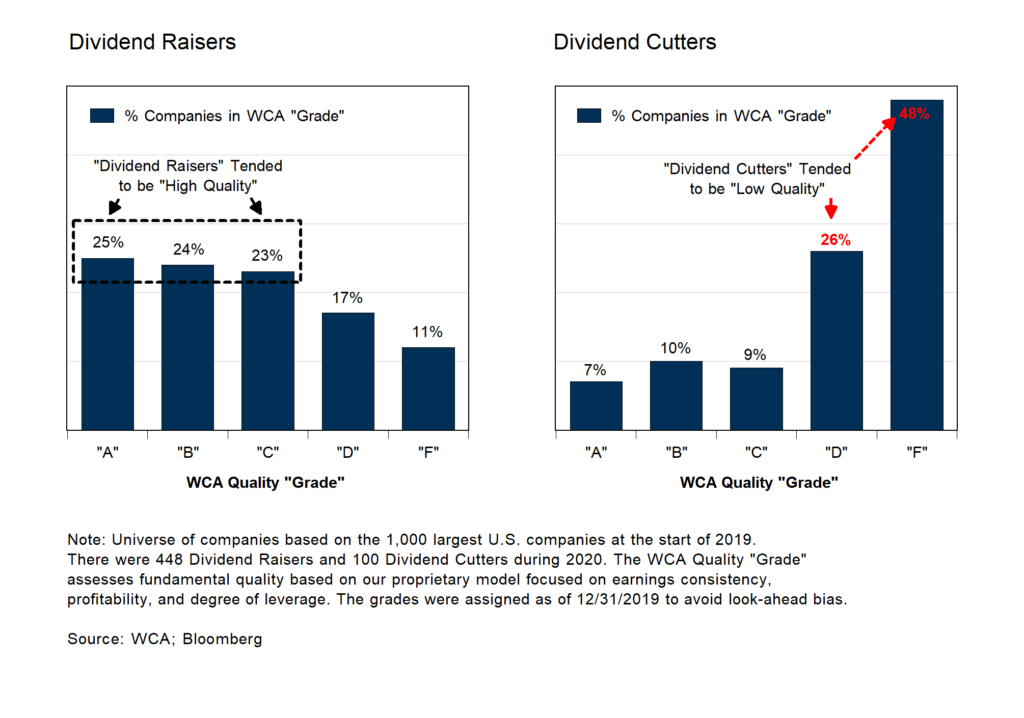
Worth the Risk
Our “Case for Rising Dividend” takes a long view and observes positive things about investing in quality dividend growers. It must be understood that, over shorter periods, cycles do exist. Low-quality dividend cutters will also have their day in the sun from time to time, as was the case in the first ten months of 2021. But as the pandemic experience again suggests, such rallies tend to be short-lived and may not be worth the risk.
To conclude, we offer one more chart (Chart D, below). This chart shows the return and risk of high-quality, dividend growers, low-quality stocks, and dividend cutting stocks. Notice how all four groups generated roughly similar pandemic-era returns (near 40% – 50%). More importantly, notice how those returns were delivered. The high-quality stocks and dividend growers had the same return with much less risk than low-quality or cutters.
Chart D
Returns Similar, But Risk is Very Different
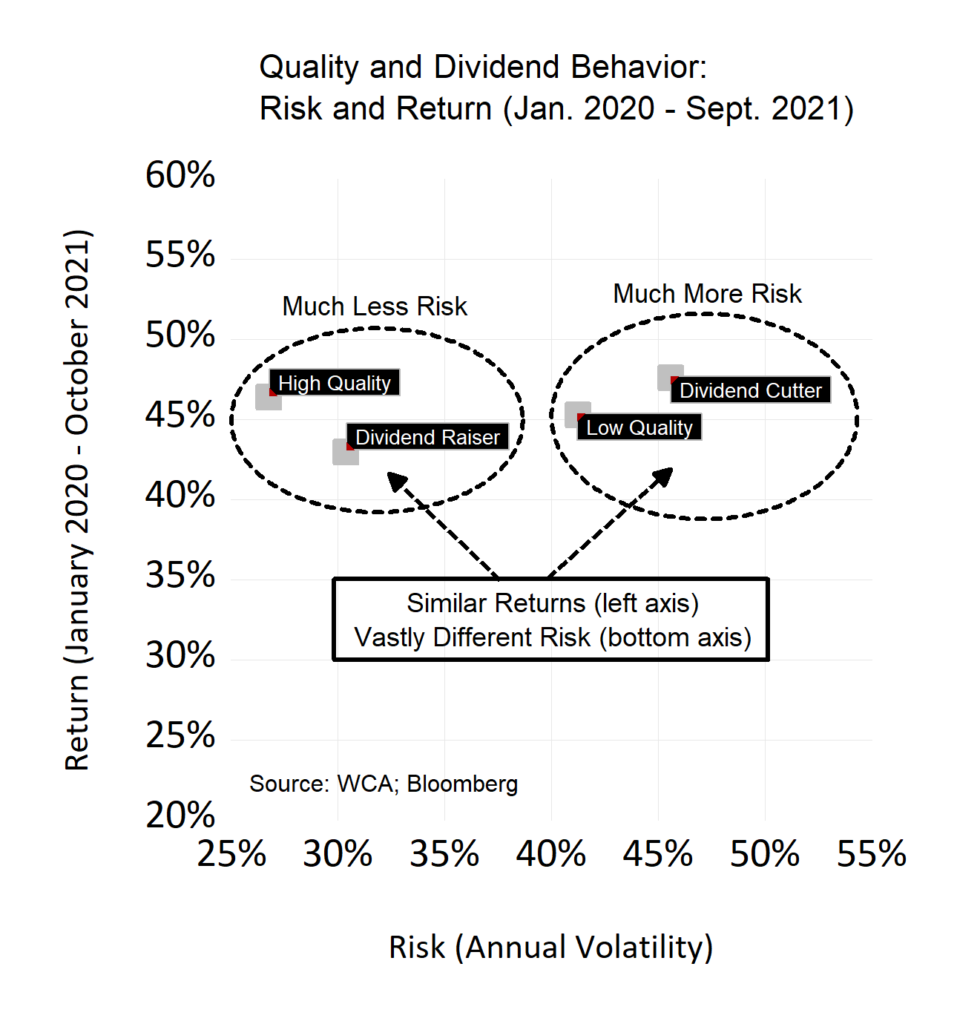
Conclusion
The pandemic era allows us to test a crucial proposition: that dividend growth points to quality. The evidence and facts of the past 22 months support this proposition. Combining a longer view of dividend growth and quality with the “stress test” of the pandemic provides robust evidence that a long-term investment strategy focused on fundamental quality is a sound way to build wealth and grow income over time.
Disclosures:
The Washington Crossing Advisors’ High Quality Index and Low Quality Index are objective, quantitative measures designed to identify quality in the top 1,000 U.S. companies. Ranked by fundamental factors, WCA grades companies from “A” (top quintile) to “F” (bottom quintile). Factors include debt relative to equity, asset profitability, and consistency in performance. Companies with lower debt, higher profitability, and greater consistency earn higher grades. These indices are reconstituted annually and rebalanced daily. For informational purposes only, and WCA Quality Grade indices do not reflect the performance of any WCA investment strategy.
Standard & Poor’s 500 Index (S&P 500) is a capitalization-weighted index that is generally considered representative of the U.S. large capitalization market.
The S&P 500 Equal Weight Index is the equal-weight version of the widely regarded Standard & Poor’s 500 Index, which is generally considered representative of the U.S. large capitalization market. The index has the same constituents as the capitalization-weighted S&P 500, but each company in the index is allocated a fixed weight of 0.20% at each quarterly rebalancing.
The information contained herein has been prepared from sources believed to be reliable but is not guaranteed by us and is not a complete summary or statement of all available data, nor is it considered an offer to buy or sell any securities referred to herein. Opinions expressed are subject to change without notice and do not take into account the particular investment objectives, financial situation, or needs of individual investors. There is no guarantee that the figures or opinions forecast in this report will be realized or achieved. Employees of Stifel, Nicolaus & Company, Incorporated or its affiliates may, at times, release written or oral commentary, technical analysis, or trading strategies that differ from the opinions expressed within. Past performance is no guarantee of future results. Indices are unmanaged, and you cannot invest directly in an index.
Asset allocation and diversification do not ensure a profit and may not protect against loss. There are special considerations associated with international investing, including the risk of currency fluctuations and political and economic events. Changes in market conditions or a company’s financial condition may impact a company’s ability to continue to pay dividends, and companies may also choose to discontinue dividend payments. Investing in emerging markets may involve greater risk and volatility than investing in more developed countries. Due to their narrow focus, sector-based investments typically exhibit greater volatility. Small-company stocks are typically more volatile and carry additional risks since smaller companies generally are not as well established as larger companies. Property values can fall due to environmental, economic, or other reasons, and changes in interest rates can negatively impact the performance of real estate companies. When investing in bonds, it is important to note that as interest rates rise, bond prices will fall. High-yield bonds have greater credit risk than higher-quality bonds. Bond laddering does not assure a profit or protect against loss in a declining market. The risk of loss in trading commodities and futures can be substantial. You should therefore carefully consider whether such trading is suitable for you in light of your financial condition. The high degree of leverage that is often obtainable in commodity trading can work against you as well as for you. The use of leverage can lead to large losses as well as gains. Changes in market conditions or a company’s financial condition may impact a company’s ability to continue to pay dividends, and companies may also choose to discontinue dividend payments.
All investments involve risk, including loss of principal, and there is no guarantee that investment objectives will be met. It is important to review your investment objectives, risk tolerance, and liquidity needs before choosing an investment style or manager. Equity investments are subject generally to market, market sector, market liquidity, issuer, and investment style risks, among other factors to varying degrees. Fixed Income investments are subject to market, market liquidity, issuer, investment style, interest rate, credit quality, and call risks, among other factors to varying degrees.
This commentary often expresses opinions about the direction of market, investment sector, and other trends. The opinions should not be considered predictions of future results. The information contained in this report is based on sources believed to be reliable, but is not guaranteed and not necessarily complete.
The securities discussed in this material were selected due to recent changes in the strategies. This selection criterion is not based on any measurement of performance of the underlying security.
Washington Crossing Advisors, LLC is a wholly-owned subsidiary and affiliated SEC Registered Investment Adviser of Stifel Financial Corp (NYSE: SF). Registration with the SEC implies no level of sophistication in investment management.

